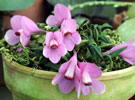|
|
|
|
|
| |
Flasks of
Dendrobium cuthbertsonii '#2' × 'Halcyon' |
|
| |
|
|
| |
| Number: |
TN3972 |
| Name: |
Dendrobium cuthbertsonii '#2' × 'Halcyon'
|
| Type: |
outcross (What's that?) |
|
Seed Donor: |
Dale Borders
|
|
Click to Enlarge

Pod Parent Blooming Plant |
Click to Enlarge

Pod Parent Capsule at 184 days |
Click to Enlarge

Pollen Parent Blooming Plant |
|
|
|
| |
Culture Notes from Donor: Parent plants: Temperature range C (52-70°F). Must be grown cool and damp.
Comments: Flowers last for 10 months! Must be grown cool and damp.
Pod parent plant: Plant is the offspring of 'Thomas' x 'Christopher John'. Flowers last for 10 months.
Pollen parent plant: a 'Tangerine' x 'Christopher John' cross
For additional origin/habitat information supplied courtesy of
Charles and Margaret Baker, see further below, near the bottom of this page.
|
Temperatures we attempt to use in the lab & greenhouse:
| For Species: |
|
Spring, Summer, Autumn, Winter: days average 75°F, nights 52°F; best fit is Cool 70-52°F
(Source:
Baker's Web OSC) |
|
About the name...
| Etymology of |
cuthbertsonii |
|
Named for Cuthbertson, Australian surveyor, who organized c. 1880 an expedition to New Guinea.
(Source:
Mayr & Schmucker 1998) |
| Etymology of |
Dendrobium |
|
From Greek "dendron" tree and "bios" life.
(Source:
Pridgeon 1992) |
| Pronunciation of |
Dendrobium |
|
den-DRO-bee-um
(Source:
Pridgeon 1992) |
|
If you would like to direct someone to this web page, please copy and paste this URL into your email:
http://troymeyers.com/d?013972
| Flask Information |
| Availability: |
We have sold all of the flasks for this item. |
| You should: |
Consider getting individual plants or compots instead of a flask.
You can place a "Notify Flask Recipients" Request, and either we or a flask recipient may contact you when plants are available.
You may also place a "Notify Retries" Request, and if an identical pollination (the same parents) is done again, we'll let you know.
You may reserve a flask, but it's very unlikely you'll get one ...this could only happen if we found a flask that we didn't know we had. |
| Yield Estimate: |
240 plants (based on flask surveys done 01/24/2006 through 10/17/2006)
|
| Plantlet Sizes: |
From many flasks 15 - 60 mm plants (based on flask surveys done 08/08/2006 through 05/18/2007)
From one most recently surveyed flask 20 - 50 mm (05/18/2007)
|
|
You might also want to:
|
View the seed assay for this item.
View items of the same species.
View items of the same genus.
|
| Ordering Information |
| You are not currently logged in. |
|
You must be a registered user and be logged in to reserve a flask or place a notification request. Please log in:
|
|
|
|
|
|
| |
The origin/habitat information below is supplied courtesy of Charles and Margaret Baker
The following information is based on the name of the plant provided by the donor, and assumes that the name is correct. If the plant has been misidentified, then the following information may not be correct.
This text is copyrighted by the Bakers and may not be reproduced without permission.
ORIGIN/HABITAT: New Guinea. Plants grow at high elevations on moss-covered
trees, on mossy rocks near streams, and on cliff faces and east-facing
road cuts where the roots attach to the clay soil beneath the covering of
moss, lichens, and other small plants. They are found in shady places as
well as on exposed mountain peaks in typical alpine habitat, where they
are exposed to breezes. Plants are reported from as low as 2450 ft. (750
m), but they are more often found at 6550–11,500 ft. (2000–3500 m).
Schlechter (ref. 437) indicated that the high alpine species require "much
moisture for their cultivation and under no circumstances will they
tolerate high, continuous heat. Where they occur, particularly in the
mornings during their growth periods, the temperature drops to 41F (5C)
and below."
More about this information and the Bakers...
|
|
|
| |
|
|
|